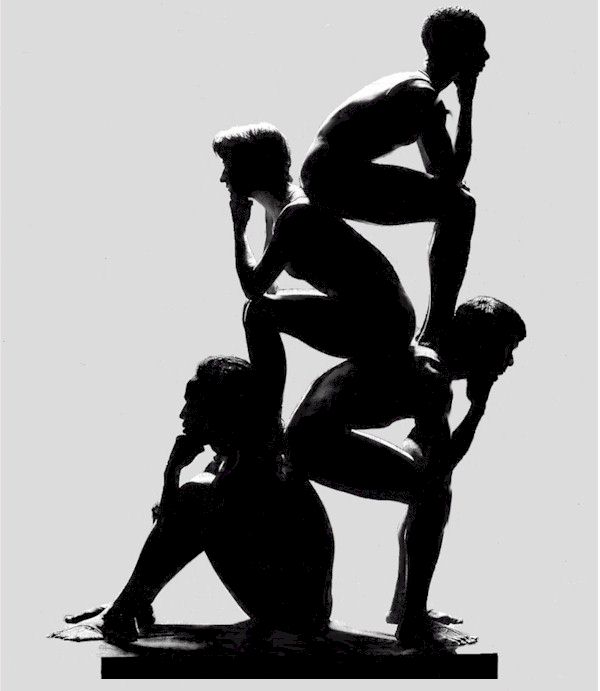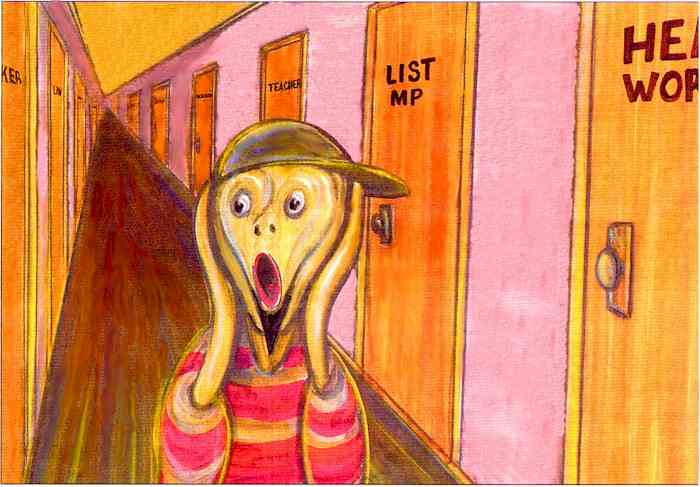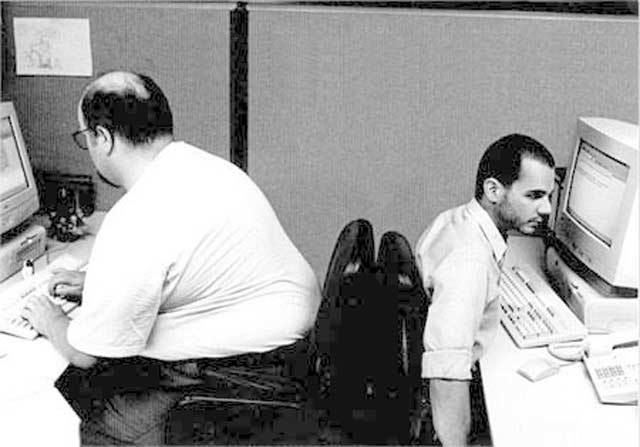Which Way to Go
Making the Tough DecisionA grad student, a post-doc, and a professor are walking through a city park and they find an antique oil lamp.
Groupthink If you have a tough decision to make, consider these suggestions before you make your final move.
Source: "Communication Briefings" from The Business Magazine, Wellington, February 1995
The Big, Big Questions to Help You Plan Your Working Life
Don't panic! Finding out what career could be right for you takes some planning and research, plus an ability to ask yourself some key questions. Some people know exactly what career they want. Others only have a number of vague ideas or absolutely no idea at all. If you are a school leaver or new graduate in this position, or if you are dissatisfied with your present career choice, don't panic - you are not alone. The good news is that it is within your power to create a fulfilling future. A good place to start is to focus on what you would like to do in an ideal world, not on what you think you should do. It's never too late - internationally-known fashion designer Christian Dior didn't work out what he wanted to do until he was 40. Jobs and work styles have changed radically over the last decade. Not only are you unlikely to stay in one job forever, but you are likely to change jobs (and even careers) more than six times in your working life. This new style of career is called a "portfolio career". A good education and developing a range of skills is important but happiness is the key for long-term planning. There is truth in the old adage that money doesn't make you happy, but if you are happy in your job, your chances of generating money are probably increased. As you spend most of your life at work, the trick is to study or choose an area of work that personally motivates you and enriches your life. Too many people go through life jumping from one job to another because of dissatisfaction with what they already have. You don't want to become a clock-watcher and wish your life away. You want to jump out of bed each morning with enthusiasm. The important thing to remember is to follow your interests. This does not just mean hobbies. All activities that you enjoy spending time on are relevant. They can give you clues to your motivation and commitment and show you how you can apply yourself to tasks which interest you. The website at www.nz.yourcareerguide.comsuggests you ask yourself these questions:
If you are feeling stuck or uninspired, a bit of self assessment will help you on your way. Self-assessment means thinking deeply about yourself and examining and analysing your values, ethics, attributes, skills and goals. It can be difficult but it is an important part of career planning because you need to understand what makes you tick before you can be really sure of what you want to do. You also need to know what work environment would suit you. It is no good being a florist if you are allergic to pollen or a lawyer if you don't like stress. It is important to be honest with yourself when you are doing your self assessment. Everyone has good and not so good points and a good way to find out what these are is to honestly answer the following questions:
There are no right or wrong answers, but they help you to paint a picture. Your values are also important when considering career options. These are issues that matter most to you and which influence your decision making and affect your attitudes to other people, events and your work. Ask yourself what you look for in a career. Is it money? Status? Contact with like-minded people? The ability to make a difference? The challenge? What was important to you when you were younger? Have your values changed? And what effect will your values have on your choices of occupation or employer? A British site at www.prospects.csu.ac.uk suggests it is also helpful to assess your personal qualities. There are benefits in considering roles that might suit your personality and temperament. If you are adventurous perhaps a career in the army is for you, or if you are creative and like a bit of adrenaline, you might suit a career in advertising or sales. If you like shopping you could become a fashion buyer or stylist. Fashion buyer and owner of Unity Collection, Tania Rupapera, studied photography at polytechnic and started photographing the work of the fashion design students. She was inspired to set up a small shop selling the clothes of design students and graduates. She now has shops in Wellington and Auckland and her job requires her to travel overseas on buying trips. She says she "buzzes herself out" when she thinks about the job she's created for herself - a job where she gets to go shopping. Once you identify what it is you want, you can create your dream job too. When carrying out your self-assessment, it is also important to consider your skills. No matter what field of work you enter, employers want analytical skills, computer skills, work experience, flexibility, leadership and teamwork skills, good oral and written communication skills, high motivation, reliability, good academic results and participation in extra curricular activities. If you know what job you are after then develop the technical skills required in that area along with the general skills above. If you are not sure what you want to do, then concentrate on developing the gaps in your general skills. You can do this by doing further study to learn a wide range of skills and knowledge, gaining work experience where you can, participating in a range of activities and mixing with different people. If you are at school it is good to talk to people such as parents, teachers and careers advisers but ultimately you have to trust your own judgment. Speak to people about careers that appeal to you and see if you can observe them at work for a day or two, or get some work experience. If you're still at school it is a good idea to speak to your school careers adviser. Just remember a good careers adviser does not tell you what they think you can and cannot do. Theirs is only one opinion so don't let that stop you from following your dream. Tertiary institutions also have plenty of careers services on campus and beyond campus there are private career consultants along with Career Services rapuara and a range of recruitment agencies. Career Services rapuara is a Crown entity and some of its services are government funded. It also offers advice on everything from career planning to CV (resume) writing. It also runs a useful website at kiwicareers.govt.nz. Source: The Evening Post, Employment Section, Wednesday 2 May 2001
For University Grads, Salaries Rise by DegreesUniversity graduates with engineering and computer science diplomas get the best-paying jobs, while an education degree yields the lowest monthly income, the census bureau concludes. Full-time workers 18 and older with engineering diplomas made an average $4,680 a month in 1996, while those with degrees related to computer work averaged $4,416 a month, the bureau says in a new report. Education majors made the least, averaging $2,802 a month in 1996. The figures, the latest available, were based on a survey separate from the 2000 Census. Overall, 31% of Americans 18 and older had degrees above the high school level, up from 21% in 1984, the report's first year. Source: USA Today 12 April 2001
Engineers and computer scientists are made hot by degrees?
An engineer, a physicist and a mathematician find themselves in an anecdote, indeed an anecdote quite similar to many that you have no doubt already heard. After some observations and rough calculations the engineer realises the situation and starts laughing. A few minutes later the physicist understands too and chuckles to himself happily as he now has enough experimental evidence to publish a paper. This leaves the mathematician somewhat perplexed, as he had observed right away that he was the subject of an anecdote, and deduced quite rapidly the presence of humour from similar anecdotes, but considers this anecdote to be too trivial a corollary to be significant, let alone funny.
Good Odds
Source: phdcomics.com 15 November 1997
Graduates Double Salaries with an MBAAfter earning a master's in business administration, female graduates see an average salary increase of 100%, and men see an 89% increase. The average female with a BA earns $40,000 starting out. With an MBA, she would earn $80,000. The average male with a BA earns $45,000 starting out. With an MBA, he would earn $85,000. Source: USA Today by Shannon Reilly and Sam Ward from data taken from the Graduate Management Admission Council, 2001 Global Survey
What Career Will Suit Your Personality?I found this site online and took their quiz on career choices (they have several quizzes about various facets of life). I found the questions somewhat shallow, but the results weren't too far off the mark, so you might want to go and give it a try - it's free. This was my result:
Source: quiz.ivillage.co.uk I can't help but wonder if you could answer the questions in such a way that it would come back and say, "You are a lazy loser. Why not just give up?"
Is this the job you want?
For articles related to working including why, which career, bosses, time constraints, focus, trends, gender issues, pay differentials, getting laid off, getting re-hired, dependents, part-time work
and balancing work and values click the "Up" button below to take you to the Index page for this section on Working. |
 Animals
Animals Animation
Animation Art of Playing Cards
Art of Playing Cards Drugs
Drugs Education
Education Environment
Environment Flying
Flying History
History Humour
Humour Immigration
Immigration Info/Tech
Info/Tech Intellectual/Entertaining
Intellectual/Entertaining Lifestyles
Lifestyles Men
Men Money/Politics/Law
Money/Politics/Law New Jersey
New Jersey Odds and Oddities
Odds and Oddities Older & Under
Older & Under Photography
Photography Prisons
Prisons Relationships
Relationships Science
Science Social/Cultural
Social/Cultural Terrorism
Terrorism Wellington
Wellington Working
Working Zero Return Investment
Zero Return Investment


